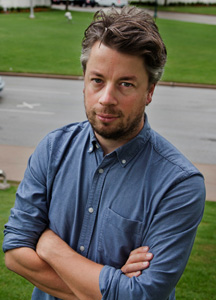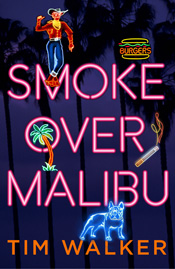 I’ve always believed the best way to get the measure of a city you’re about to visit is to read a crime novel on the plane. If you’re on your wayto Edinburgh, pack an Ian Rankin. If you’re headed to New York, keep a Richard Price handy. A weekend in Venice? Not without one of Donna Leon’s Guido Brunetti series, or Michael Dibdin’s Dead Lagoon.
I’ve always believed the best way to get the measure of a city you’re about to visit is to read a crime novel on the plane. If you’re on your wayto Edinburgh, pack an Ian Rankin. If you’re headed to New York, keep a Richard Price handy. A weekend in Venice? Not without one of Donna Leon’s Guido Brunetti series, or Michael Dibdin’s Dead Lagoon.
A guidebook shows you the landmarks and the pricey pizza places; a crime writer takes you down the back streets to the buried truth.
In 2012, when I moved to Los Angeles as a correspondent for The Independent, I took a deep dive into Raymond Chandler and Michael Connelly. I brushed up on James Ellroy and Walter Mosley, and introduced myself to Robert Crais.
If your idea of LA in fiction comes from Baywatch or Entourage, you might think the city was made up exclusively of blue skies, palm trees and celebrities stuck in traffic, all within sight of the Hollywood sign. But read just one oftheabove-mentioned authors and you soon learn it has far more than its fair share of violence and vice, brutal criminals and just-as-brutal cops.
I lived in a house in the Echo Park neighbourhood, with art deco light fittings and retro appliances that made it feel like a place where Chandler’s PI Philip Marlowe might find a body. A reporter is several steps from a detective, but in my work I explored corners of the city that no tourist – and not even most of my Angeleno friends – would ever encounter by chance.
I didn’t find any bodies, but in Compton I came across what might have been the best BBQ ribs west of Texas. I surveyed the art scene in Culver City and the tech scene in Venice Beach. I toured industrial suburbs run by notoriously corrupt officials, and climbed the steps of City Hall like the casts of Dragnet and LA Confidential before me.
I met Latinos, Asian and African-Americans, actors, musicians and comedians. I met an anonymous street artist who’s also a homelessness activist. I met the chef who started the food truck movement, and a legendary arthouse filmmaker who spent the whole hour passive-aggressively flicking cigarette butts at the floor near my feet.
I interviewed ex-cops. I interviewed a mortician. I interviewed Michael Connelly (Raymond Chandler wasn’t available).
When I decided to pour these experiences into a novel about the city, it had to be a detective novel. Chandler is to LA what Charles Dickens is to London: he translated into fiction the city’s tone and feel – what Connelly described to me as a kind of “cynical hopefulness”. If Paris has romance, then LA has hardboiled (although, granted, Paris also has Maigret).
It’s no coincidence that when Hollywood tackled some of the city’s foundational myths, the genre it chose as its vehicle was the hardboiled mystery: think of Chinatown and the water conspiracy, or Who Framed Roger Rabbit? and the demise of LA’s red car public transport system, or The Black Dahlia, based on Ellroy’s novel about the infamous murder case.
The detective in my new novel Smoke Over Malibu is probably more Bob Hoskins than Jack Nicholson. Lucius ‘Lucky’ Kluge is a sometime screenwriter who now works for an LA antiques business. When his former writing partner and ex-best friend goes missing, and then his elderly boss is assaulted during the theft of a vintage cookie jar, he reluctantly turns investigator.
I’ve taken to describing the book as The Big Lebowski-meets-Lovejoy. Like Lebowski, the great 1998 Coen Brothers movie, It’s partly a comic homage to Chandler and partly a wry love letter to LA. Like Lovejoy, it features antiques. And like me, Lucky is a British ex-pat, who knows a lot but still has plenty to learn – about the city, and about himself.
He’s also a movie obsessive who venerates the Hollywood of the 1970s – films like Chinatown and The Long Goodbye, which starred Elliot Gould as Marlowe, a character built for the 1940s but transplanted to the 70s by director Robert Altman. Lucky, too, is a man out of time.
Crime aficionados may spot, sewn into the novel’s narrative, my references to The Long Goodbye, to Dashiell Hammett’s The Maltese Falcon or even to Ross MacDonald’s The Underground Man.
So, if you’re ever on a plane to Los Angeles, be sure to read some Raymond Chandler. But maybe pack Smoke Over Malibu for the return flight.

William Heinemann (26 Jan. 2017) Hbk £18.99
Buy From Shots £15.99 Hbk
depade naltrexone
link revia and alcohol